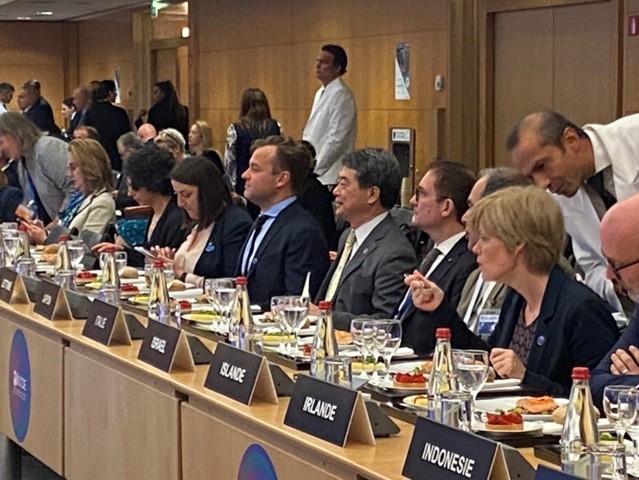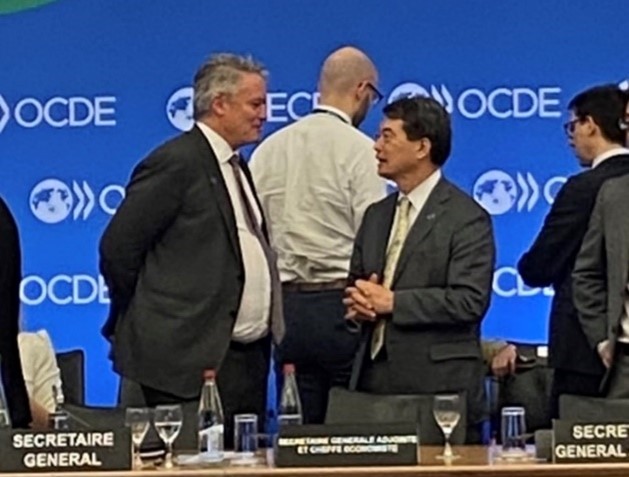- Home
- News Releases
- Back Issues
- June FY2022
- Vice-Minister for International Affairs Hirose Attends the 2022 OECD Ministerial Council Meeting
Vice-Minister for International Affairs Hirose Attends the 2022 OECD Ministerial Council Meeting
June 13, 2022
Mr. Hirose Naoshi, Vice-Minister for International Affairs of the Ministry of Economy, Trade and Industry (METI) attended the OECD Ministerial Council Meeting, held in Paris on June 9 and 10. During the meeting, attendees discussed the impacts from Russia's aggression against Ukraine, trade and environmental sustainability, OECD and Africa's partnership, the future for the youth, and green transition. They also adopted a ministerial statement.
1. Overview of the meeting
- This year’s Ministerial Council Meeting was chaired by Italy, with "The Future We Want: Better Policies for the Next Generation and a Sustainable Transition" as its theme. The attendees also adopted a ministerial statement there. Mr. Yamagiwa Daishiro (Minister for Economic and Fiscal Policy), Mr. Miyake Shingo (Parliamentary Vice-Minister for Foreign Affairs), and Vice-Minister Hirose joined as representatives from Japan.
- During the Opening Session, Secretary-General Cormann stated that now—in the face of several issues including Russia's illegal aggression , recovery from the pandemic, and climate change—is the time to exhibit international cooperation and under the OECD's expertise. Ukraine’s President Zelenskyy (who participated online) stated that Russia's aggression violates all of the EU's rules, and that rather than letting the energy issues that are historically prone to becoming complicated in Europe divide it, the continent should take action to protect Ukraine, and defend our shared values—such as democracy.
- A ministerial statement that took into account each country's viewpoints and opinions was adopted at the closing of the meeting. It included the following points:
(1) Responsible business conduct:
Acknowledging the importance of strengthening international cooperation on global supply chains, including by enhancing clarity and predictability for business that respect human rights in supply chains
(2) Digital transformation:
Developing high level principles for trusted government access to personal data held by private sectors and promoting cooperation to support global initiatives on cross-border data flow and data free flow with trust (DFFT)
(3) Trade:
Supporting ongoing work on trade and environment at the WTO—and to that end, reinforcing their work on the intersection between trade, investment, and environment
(4) Climate change:
Welcoming the Inclusive Forum on carbon mitigation approaches as an instrument to facilitate the dialogue to enhance cross-border cooperation on climate mitigation policies
- Vice-Minister Hirose joined the "Green Transition for Future Generations" session and made the following remarks.
Remarks (from "Green Transition for Future Generations" on the 10th)
Achieving carbon neutrality is an issue that must be addressed worldwide—including by developing countries. We recognize the fact that diverse paths exist and share the commitment to that accomplishment. Having diverse, realistic approaches that utilize a wide array of energy sources and technologies is important.
Green Transformation (GX) is the key to completely transforming our economic and social systems in order to reduce emissions and strengthen industrial competitiveness. Promoting GX requires creating markets and rules that facilitate technological innovations, along with transition financing for industries with heavy emissions.
When we discuss international rules to ensure a level playing field and prevent carbon leakage, we must compare both policies themselves and the carbon intensity that result from them. The need to compare and evaluate emission intensity and various mitigation efforts was also recognized at Germany's G7 Climate, Energy, and Environment Ministers Meeting.
The Inclusive Forum on carbon mitigation approaches proposed by the OECD could become a useful platform if we focus on those emission intensity results rather than just specific measures. We hope to work together with countries involved in the OECD and G20 to achieve positive results.
DFFT (data free flow with trust) is important for digital transitions. The OECD can contribute significantly here, given its expertise in the field. The Digital Trade Inventory project and the gap analysis of the actual barriers and boundaries companies face on cross-border flow of data would be helpful. Based on the results, we will coordinate materializing DFFT further for the G7 Japan’s Presidency in 2023.

